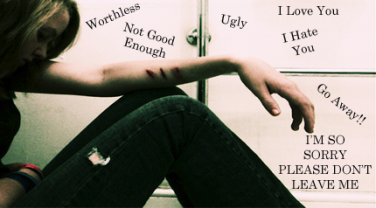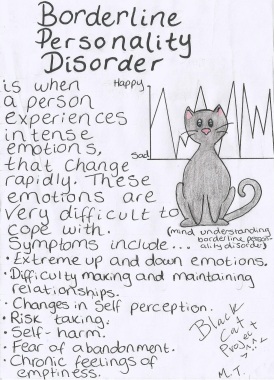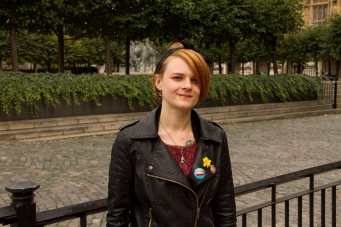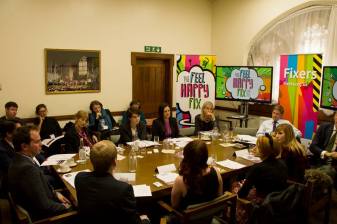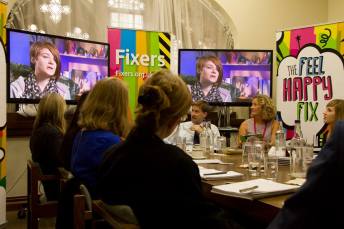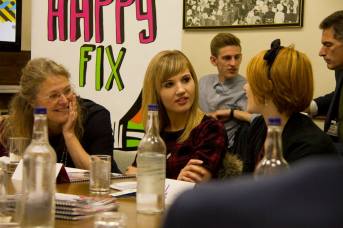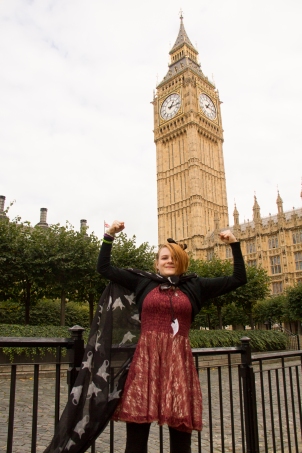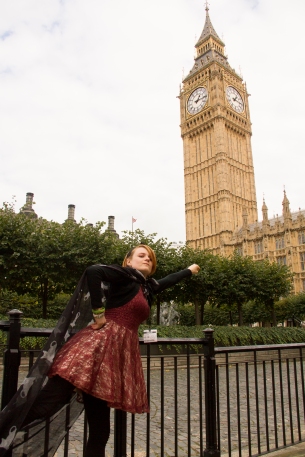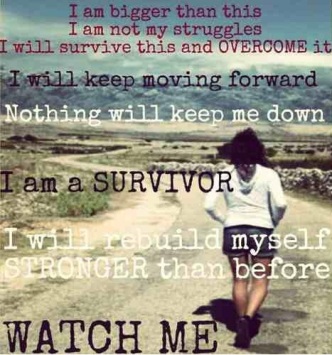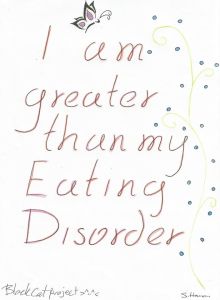 Before I go on to explain to you what eating disorder are let look an one word which EVERYONE thinks of when eating disorders are mentioned! DIET
Before I go on to explain to you what eating disorder are let look an one word which EVERYONE thinks of when eating disorders are mentioned! DIET
As a society when we say ‘diet’ we immediately associate it with weight loss. The word diet actually means what we eat, weather we are trying to lose weight or not. We can have a ‘healthy diet’ or an ‘unhealthy diet’ etc.
Diet Definition
The kinds of food that a person, animal, or community habitually eats:a vegetarian diet[i].
You got that? Good. Now what is an eating disorder?
Eating Disorders – An Overview
Eating disorders are characterised by an abnormal attitude towards food that causes someone to change their eating habits and behaviour[ii]. Eating disorders are serious mental health condition where a person uses food as a way of control or to avoid dealing with, or express difficult emotions. There are many causes of an eating disorder these could be genetic, psychological, environmental, social and biological influences[iii].Over 725,000 men and women in the UK are affected by eating disorders[iv], which is a staggering number of people. Eating disorders claim more lives than any other mental illness – one in five of the most seriously affected will die prematurely from the physical consequences or suicide[v], making is one of the most dangerous mental health conditions.
Types of Eating disorders
I think it is really important to remember that anyone can have an eating disorder, you can be any size. Also it is important to remember eating disorders are a mental illness.
Weight is a Side effect. NOT the illness.
It is generally accepted that there are four types of eating disorders. These are:
- Anorexia Nervosa
- Bulimia Nervosa
- Binge Eating Disorder (BED)
- Atypical Eating disorder/ Eating Disorder Not Otherwise Specified (EDNOS)
IMPORTANT- this is a brief explanation please look at Beat for more in-depth explanation.
Anorexia Nervosa[vi]
Anorexia is a mental illness where people have a low weight and so this by restricting food vomiting laxatives or excessively exercising. People with anorexia have a distorted view of their body and go to great lengths to hide this from friends and family. Those with anorexia usually have other mental health conditions as well. Anorexia has serious implications on a person’s physical health, friendships and relationships.
Bulimia Nervosa[vii]
Bulimia is a mental illness where a person feels out of control with their eating. They are trapped in a vicious cycle, alternate between eating a large about of food in a small session (Binge) and trying to prevent subsequent weight gain by, vomiting, using laxatives or diuretics or exercising (Purging). Those with bulimia often are in the normal weight range. However, it can have serious repercussions on a person’s psychical health, friendships and relationships. They may also have other mental health conditions.
Binge Eating Disorder (BED)[viii]
Binge eating disorder is a serious mental illness where people experience a loss of control and overeat on a regular basis. Those with BED eat large amounts of food in a short about of time (Binge).however, the difference between bulimia and BED is those with BED do not try and prevent the subsequent weight. It is not about large food portions. They are often not hungry, and are often ritualistic E.g. buying ‘special’ binge food. The binge usual takes place in private. People often feel guilt, and shame, and has serious effects on psychical and mental health.
Atypical Eating Disorder/ Eating Disorder Not Otherwise Specified (EDNOS)[ix]
Those diagnosed with Atypical Eating disorder/ Eating Disorder Not Otherwise Specified, generally display symptoms of an eating disorder that does not fit the diagnosis of either Anorexia or Bulimia. For example, the frequency of binges and purges isn’t enough to fit the criteria of bulimia or, a person’s weight is not low enough to fit the criteria of Anorexia. This does not mean it is less severe or dangerous. 50% of all people diagnosed with Eating disorder are diagnosed with Atypical Eating Disorder/ Eating Disorder Not Otherwise Specified the latest diagnostic criteria no longer uses this term and people would be diagnosed with anorexia, bulimia or binge eating disorder, according to the Beat charity for eating disorders.
I Think I Have An Eating Disorder[x]
Anyone can have an eating disorder regardless of gender, age, where you live or your level of education. Anyone can develop and eating disorder and it should be treated seriously, it is a mental illness and is a way that people have developed to cope with difficult feeling memories or situations.
Eating disorders are very complex, no one treatment works for everyone. People can switch between eating disorders. Some people are worried about speaking help because they feel ashamed or embarrassed, or that there condition isn’t ‘serious enough’ to warrant help. If you are worried or upset, regardless if you have the symptoms it is important to speak to someone about it, don’t bottle it up. Remember it is an illness, you don’t have to be ashamed.
Recovery is possible if you seek out help.
Your first port of call will be your GP. You GP may refer you to secondary mental health services such as the Community Mental Health Services (CMHT) or Children and Adolescent Mental Health Services (CAMHs). Who can refer you to specialist Eating Disorders Team, or possibly in-patient services.
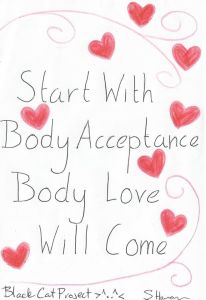 Eating Disorder Experiences
Eating Disorder Experiences
Although I have suffered from an eating disorder, I thought I would call on fellow Fixer Angharad, to give you a different perspective.
What is it like to have an eating disorder?
‘Having an Eating Disorder is hell on earth. It’s not glamorous, in fact it is very dangerous. Eating Disorders are incredibly isolating illnesses. You end up being or feeling very alone and not understood at all.’ Angharad
‘It’s like chasing a rainbow, you think that if you lose weigh everything be brilliant, that you will be happy, you lose some weight, but your still not happy, and around the cycle you go again. You end up trapped in your mind, suffering in silence. The sad truth is you will never reach that ‘goal weight’. It’s a death sentence.’ Sarah
How does it affect your life?
‘Suffering with an Eating Disorder affects every aspect of one’s life. There is not one part of life that is left untouched by the horrors of an eating disorder. You get sucked in completely and end up suffocated. You are weak and tired all the time, you can barely walk, you struggle to think strait, you lose friends and you lose your whole life.’ Angharad
‘Constant hunger, bed sores, insomnia irritability, constipation, poor circulation and chilblains. Eating disorders are a death sentence. Your friends disappear, family falls into chaos out of desperation, “why won’t she eat?” your life falls apart, everything is dictated by your eating disorder’ Sarah
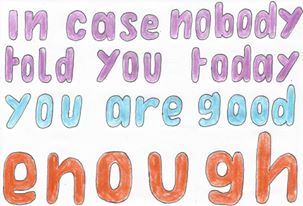 Any tips for coping with an eating disorder?
Any tips for coping with an eating disorder?
‘Eating Disorders are extremely difficult to cope with. It is more of a daily battle. Someone suffering with an Eating Disorder needs to realise that the Eating Disorder is the enemy, not the friend it makes out to be. Lean on family friends for support and remember you are not alone. Reach out for whatever help you need and keep talking as much as possible.’ Angharad
‘Getting help, admitting your ill is hard, I know. However, it’s the first step to recovery. Surround yourself with supportive family and friends. Explain to them what’s happening in your mind. Seek out support from charities whether that is online, over the phone or in-person and never give up! Recovery is possible!’ Sarah
please seek help if you think you may have an eating disorder!
Eating disorder charity
Beat eating disorders
anorexia bulimia care
Men Get Eating Disorders Too
Mind
[i] http://www.oxforddictionaries.com/definition/english/diet
[ii] http://www.nhs.uk/conditions/Eating-disorders/pages/introduction.aspx
[iii] http://www.b-eat.co.uk/about-eating-disorders/types-of-eating-disorder
[iv] http://www.b-eat.co.uk/about-eating-disorders/types-of-eating-disorder
[v] http://www.b-eat.co.uk/about-eating-disorders/types-of-eating-disorder
[vi] http://www.b-eat.co.uk/about-eating-disorders/types-of-eating-disorder/anorexia
[vii] http://www.b-eat.co.uk/about-eating-disorders/types-of-eating-disorder/bulimia
[viii] http://www.b-eat.co.uk/about-eating-disorders/types-of-eating-disorder/binge-eating-disorder
[ix] http://www.b-eat.co.uk/about-eating-disorders/types-of-eating-disorder/ednos
[x] http://www.b-eat.co.uk/about-eating-disorders/do-you-have-an-eating-disorder/recovery-is-possible
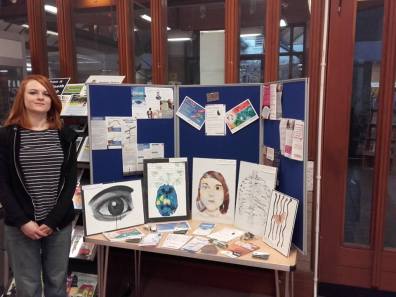
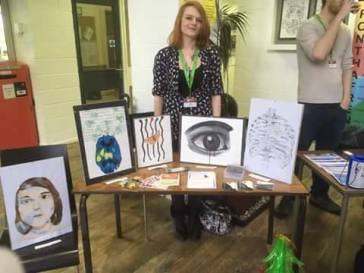
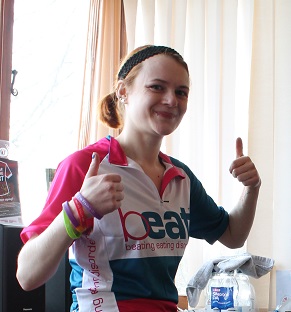 In my short life I have fund-raised for many charities. But Beat is a very important charity to me. The parent helpline helped my mum with finding help and support for me. They have also given me advice when I needed it.
In my short life I have fund-raised for many charities. But Beat is a very important charity to me. The parent helpline helped my mum with finding help and support for me. They have also given me advice when I needed it. So using Beat’s Help Finder directory of public and private services. Shows that the three closest treatment centres are:
So using Beat’s Help Finder directory of public and private services. Shows that the three closest treatment centres are: On Friday the 26th February there were bucket loads of cake available including healthy and Vegan cakes. I started at 10am and with help from some volunteers in finally made it at 3.20pm I reached the final target of 77.9 miles. To say I was exhausted was an understatement. All the members at Ponthafren counted down with me to each target with a huge round of applause. It was a huge achievement for me and it demonstrates how far someone could possibly have to travel to get specialist help.
On Friday the 26th February there were bucket loads of cake available including healthy and Vegan cakes. I started at 10am and with help from some volunteers in finally made it at 3.20pm I reached the final target of 77.9 miles. To say I was exhausted was an understatement. All the members at Ponthafren counted down with me to each target with a huge round of applause. It was a huge achievement for me and it demonstrates how far someone could possibly have to travel to get specialist help.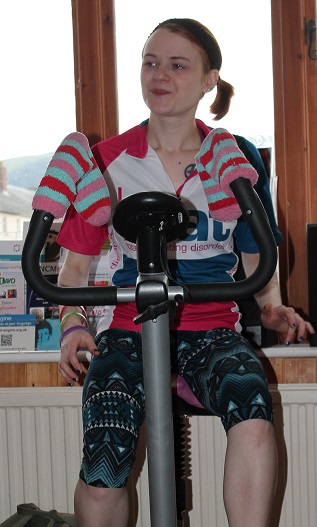 It’s not the amount of money we raised that counts but the fact we did it! I hope there comes a day when eating disorders are more understood and treatment is easier to access.
It’s not the amount of money we raised that counts but the fact we did it! I hope there comes a day when eating disorders are more understood and treatment is easier to access.
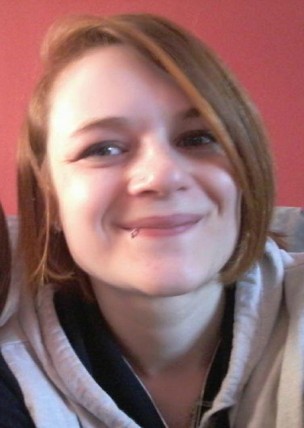

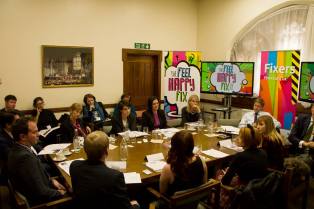
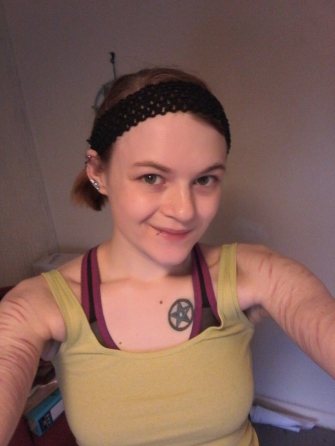
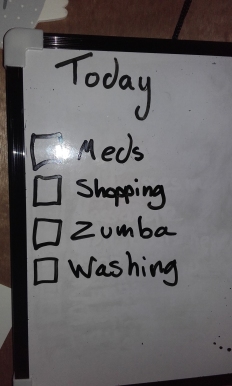
 This time of year can be hard for everyone. It can be especially hard for those with mental health problems. So here are some tips for getting through the holidays.
This time of year can be hard for everyone. It can be especially hard for those with mental health problems. So here are some tips for getting through the holidays.

 When people think mental illness, they think Depression, Anxiety, Bipolar, schizophrenia and many more. But people forget that Postnatal Depression (PND) is a mental illness. From speaking to friends who have experienced Postnatal Depression they have been blamed for the illness or have been ignored by family members. Postnatal Depression is not a normal part of child birth. To me this is infuriating, especially as I have seen people go through this. One mother told me that there doctor refused to refer her to local Community Mental Health Team (CMHT) as ‘Postnatal Depression is hormonal and can be treated with medication’. This really doesn’t help with the feeling of they are the one at fault.
When people think mental illness, they think Depression, Anxiety, Bipolar, schizophrenia and many more. But people forget that Postnatal Depression (PND) is a mental illness. From speaking to friends who have experienced Postnatal Depression they have been blamed for the illness or have been ignored by family members. Postnatal Depression is not a normal part of child birth. To me this is infuriating, especially as I have seen people go through this. One mother told me that there doctor refused to refer her to local Community Mental Health Team (CMHT) as ‘Postnatal Depression is hormonal and can be treated with medication’. This really doesn’t help with the feeling of they are the one at fault.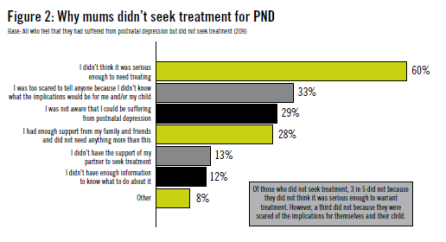 Shockingly 60% percent of those with Postnatal Depression didn’t think it was serious enough to seek treatment. Sadly 33% were too scared to tell anyone because they didn’t know what the implications would be for them and/or their child. 29% didn’t know that they were suffering from postnatal depression.
Shockingly 60% percent of those with Postnatal Depression didn’t think it was serious enough to seek treatment. Sadly 33% were too scared to tell anyone because they didn’t know what the implications would be for them and/or their child. 29% didn’t know that they were suffering from postnatal depression.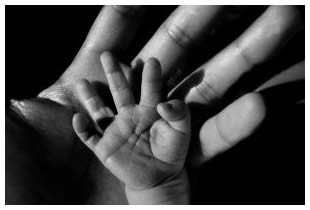 ‘In the unit, I was given more help and talking therapy. I also to some lovely people some of whom is still keep in touch with. I was discharged after three weeks. When I left the unit, I walked out the door happier and heather with the right medication it also changed my whole perception of mental illness! It really was an eye opener.’
‘In the unit, I was given more help and talking therapy. I also to some lovely people some of whom is still keep in touch with. I was discharged after three weeks. When I left the unit, I walked out the door happier and heather with the right medication it also changed my whole perception of mental illness! It really was an eye opener.’ 
